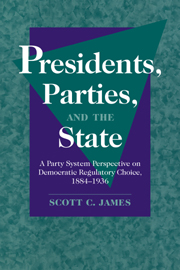 Presidents, Parties, and the State
Presidents, Parties, and the State Book contents
- Frontmatter
- Contents
- Acknowledgments
- 1 Introduction: Parties, Presidential Elections, and Regulatory Choice – A Party System Perspective
- 2 Swing States, Business Mugwumps, and the Interstate Commerce Act of 1887
- 3 The Progressive Party Vote and the Federal Trade Commission Act of 1914
- 4 Progressive Republicans and the “Death Sentence” for Public Utility Holding Companies During America's Second New Deal
- 5 Conclusion: Parties and the American Regulatory State
- Bibliography
- Index
4 - Progressive Republicans and the “Death Sentence” for Public Utility Holding Companies During America's Second New Deal
Published online by Cambridge University Press: 06 January 2010
- Frontmatter
- Contents
- Acknowledgments
- 1 Introduction: Parties, Presidential Elections, and Regulatory Choice – A Party System Perspective
- 2 Swing States, Business Mugwumps, and the Interstate Commerce Act of 1887
- 3 The Progressive Party Vote and the Federal Trade Commission Act of 1914
- 4 Progressive Republicans and the “Death Sentence” for Public Utility Holding Companies During America's Second New Deal
- 5 Conclusion: Parties and the American Regulatory State
- Bibliography
- Index
Summary
You give expression to a very firm belief that I have all along entertained, namely, that there be an amalgamation of the Republican-Progressives with the Democratic party, if the latter is to continue as a majority party in the years immediately ahead of us. So firmly am I convinced of this that I cannot understand the political short-sightedness of certain Democratic leaders who resent any recognition of the Republican-Progressives.
Harold Ickes to Raymond Moley[W]hat Mr. Roosevelt has done… is adopt neither Democratic nor Republican policies, but rather he has taken over the policies of that small group of so-called Progressive Republicans, typified by Senator Norris of Nebraska and Senator La Follette of Wisconsin… In fact, easy as it has been to attribute the New Deal policies to the mysterious “Brains Trust,” an analysis of the record will show that by far the larger part has sprung from the Progressives - that every feature of the New Deal program in years gone by has been urged by Progressive Republican Senators.
Frank R. KentIntroduction
Our consideration of the Public Utility Holding Company Act of 1935 must start earlier, with the alienation of progressive Republicans from the so-called First New Deal. Progressive Republicans were not only ardent supporters of Roosevelt for president in 1932, they were also his “staunchest friends and most effective supporters” in the early days of the New Deal. 3 But as the Seventy-third Congress wound to a close in June 1934, many of them stood ready to break with the Democratic president and his policies.
- Type
- Chapter
- Information
- Presidents, Parties, and the StateA Party System Perspective on Democratic Regulatory Choice, 1884–1936, pp. 200 - 266Publisher: Cambridge University PressPrint publication year: 2000
